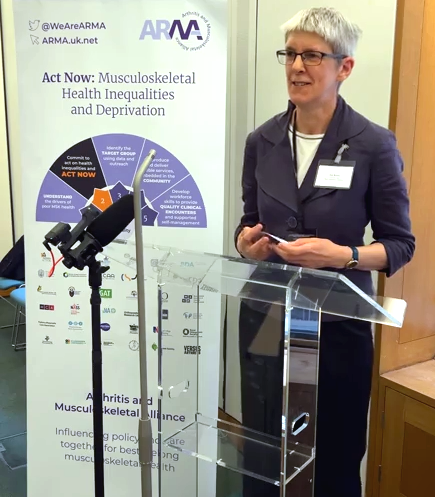 by Sue Brown, CEO ARMA
by Sue Brown, CEO ARMA
We have just passed the one year anniversary of the publication of our Act Now report on MSK health inequalities. A good time to evaluate the success of the project. It’s clear that we have made an impact. That people are acting on the key messages and recommendations. It is also clear just how far we still have to go.
When we started the project we were clear that this was not about producing a report. It was about driving action. So I am pleased to see that a year on our inequalities page continues to get a steady 50 – 100 visits a month and is the most scrolled page of our site, indicating people are interacting with the content. We continue to get invitations to present on the findings and the issues.
Most of all, I’m pleased to hear how people have been inspired by the project to take action. In the current climate, this sort of work can be difficult. NHS England and the Government talk the talk on health inequalities. But when it comes to what local providers and systems are held to account for it’s waiting lists and balancing the books. And still people are taking action. I had an email recently from Joe, the clinical lead of a FCP service, telling me about what they have been doing and how positive he felt despite the challenges. He said:
“This, for me, is a positive example of being proactive, front footed and unconventional in the way we might have traditionally executed our roles. This has ONLY come about because of the ARMA report. I cannot express how positive this feels.”
If you want to hear more about Joe’s work, he’ll be presenting at our Community of Practice on 6th May or look out for the recording on our website afterwards.
I say there is still a long way to go because there is still too little focus on tackling inequalities and providing good MSK services. For example, I have been invited to speak to a local system provider partnership about MSK health inequalities. Researching the local situation I find that rates of many MSK conditions are higher than both the national and the regional average. Yet MSK is not mentioned in the local Joint Strategic Needs Assessment. In the more deprived areas, rates of physical activity are lower and the number of people overweight is higher, pointing to some of the underlying reasons. Yet no connection is made between this and the higher rates of MSK conditions.
If the ICBs are to focus mainly on strategic commissioning, this must include a strategic approach to MSK commissioning. See our latest ICB report for more on this. The failure to include MSK in a Joint Strategic Needs Assessment does not help the situation.
Meanwhile, thank you to everyone who, like Joe, is taking action. We will continue to support you and continue raising these issues.
